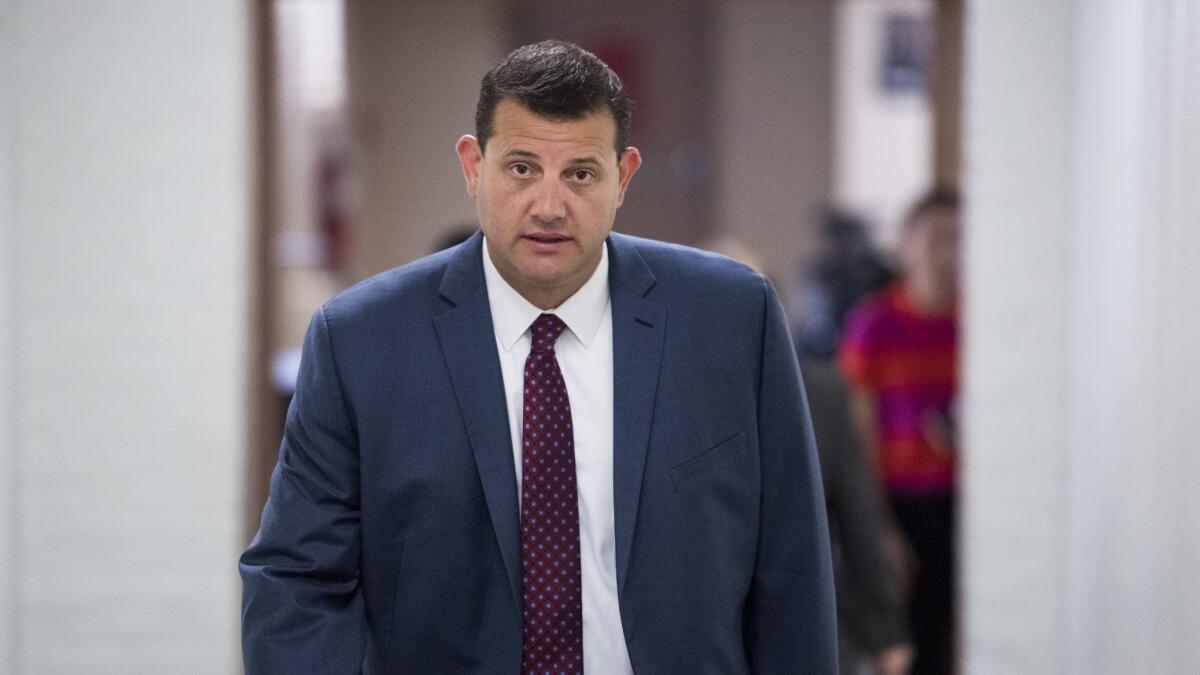After embarrassing losses in 2018, GOP is targeting these California House seats in November

- Share via
WASHINGTON — Republicans are mounting an aggressive campaign to win back some of the seven California congressional seats they lost in 2018, a repudiation that turned the GOP into an endangered species in the state.
“We think California is incredibly important,” said Rep. Tom Emmer (R-Minn.), who leads the National Republican Congressional Committee, which is responsible for electing Republicans to Congress. “We will have a very active operation making sure that we’re competitive.”
Republicans predict the 2018 Democratic victories will prove to be short-lived, in part because the Democratic candidates who promised to become moderate lawmakers ended up supporting President Trump’s impeachment and have few major bipartisan legislative accomplishments to tout.
The battle — which could answer whether California voters are done with the GOP or were merely expressing anger at Trump in 2018 — is likely to play out in four of the most competitive districts.
Former Rep. David Valadao’s campaign to unseat Rep. T.J. Cox in the Central Valley, for instance, is betting that voters feel a degree of buyer’s remorse in unseating Valadao. Robert Jones, a consultant for Valadao, said there are some “voters who might say, ‘Yes, we’re dissatisfied with the president and we let that be known in 2018. But we didn’t want David gone.’”
Democrats counter that the 2018 races reflected the long-term political realignment of a Republican Party that no longer includes moderates.
“Orange County didn’t switch overnight,” said Lucinda Guinn, executive director of the Democratic Congressional Campaign Committee, the campaign organization for House Democrats. “What happened is the Republicans who represented those districts woke up one day and realized that they were no longer reflective of the communities that they were elected to represent.”
Los Angeles Times editorial board endorsements for the U.S. House, California ballot measures and more.
The Republican attempt at a California comeback began early last year when the NRCC hired a state director — Orange County native Sam Spencer. Jessica Millan Patterson, chairwoman of the California Republican Party, said it was the earliest she’s seen national Republicans set up shop in the state.
In addition to recruiting candidates, Republicans are building a ground operation to try to counter Democrats’ successful use of “ballot harvesting” in 2018.
The legal practice — enacted in a 2016 law — allows third parties, such as volunteers for political parties, to collect mail-in ballots from voters to drop them off at a polling place.
In 2018, Republicans ignored ballot harvesting, which Millan Patterson said “would be considered fraud in any other part of this country.” But she has since promised to make it a significant part of the party’s 2020 strategy. “We need to play by the rules that we have,” she said.
State party officials have already recruited 17,000 volunteers who are out building relationships with likely voters in their communities. Those relationships will help build trust so that Republicans can collect ballots in a successful harvesting initiative this fall, she said.
In some of the key districts, Republicans recruited marquee names as candidates, including two Korean American women — prominent counter examples of the narrative that the Republican Party is dominated by white men — and two former lawmakers who are setting up rematches for their old seats.
Those four candidates are expected to mount the most formidable challenges of the seven races.
At the top of the list for both parties is the matchup between Cox and Valadao. The district voted for Hillary Clinton by 15 percentage points in 2016, initially suggesting it would be a challenging pickup opportunity for Republicans. But an NRCC survey in January found Valadao leading Cox by 5 percentage points.
Cox’s reelection effort has been bogged down by the recent revelation that the Internal Revenue Service has taken out a nearly $145,000 lien against him for unpaid taxes. Democrats say he has set up a payment plan.
Two other key competitive races are in Orange County. Democratic Rep. Harley Rouda of Laguna Beach is facing off against Republican Orange County Supervisor Michelle Steel. And Democratic Rep. Gil Cisneros of Yorba Linda faces a rematch with Republican Young Kim, a Korean American former member of the state Assembly.
Both Rouda and Cisneros are former Republicans who have successfully courted like-minded former Republicans. But both were outraised by their opponents in two of the four quarters last year.
And former Rep. Katie Hill’s resignation has put her seat on the northern edge of Los Angeles — once considered one of the safest of the seven for Democrats — up for grabs as well. Former Rep. Steve Knight is one of several Republicans vying for it.
Residents in the district will vote next week on both the special election to fill the seat for the rest of Hill’s term this year and the primary to pick the candidates for the November election to fill the seat next year — two races on the same ballot that are likely to cause confusion. Assuming no candidate gets 50% of the vote in Tuesday’s special election, a runoff will be held on May 12. Both parties are prepared for a close race.
Republicans have a few reasons to feel confident on their future in California. House Minority Leader Kevin McCarthy (R-Bakersfield) — who has taken the state losses personally, according to other Republicans — has made recapturing the seats a priority.
Several of the seven races were extremely close in 2018 — four of them weren’t called until after election day. Five of the seven were won by former GOP presidential candidate Mitt Romney in 2012 and flipped to Hillary Clinton in 2016, giving Republicans reason to think they are long-term GOP seats that they can win back.
Despite Trump’s sinking popularity statewide, Republicans are hopeful that his presence at the top of the ticket will help them. Four years ago in the presidential race, Republicans held 14 congressional districts in the state. It wasn’t until 2018 that Republicans lost seven seats.
“So I would argue that that is going to provide a difference,” Emmer said.
But while Trump wasn’t on the ballot in 2018, many voters viewed the midterm race as a measure of his presidency.
Republicans are eager for a contest between Trump and Democratic presidential front-runner Sen. Bernie Sanders (I-Vt.), whose policies they don’t believe will be an easy sell in places like Orange County.
But the GOP’s declining role in California can’t be overlooked. The party hasn’t won a statewide office since 2006. Fewer than one quarter of the state’s registered voters are Republicans. And the president in 2016 didn’t win in any of the contested congressional seats.
The party’s congressional delegation has been slowly bleeding for two decades until the precipitous drop to seven in 2018 — a number that prompted snickers on Capitol Hill that the GOP delegation could hold meetings in a minivan, dramatically dwarfed by the 46 Democrats who represent the state in the House.
Three of the seven Democrats who flipped seats don’t appear to have contested races so far.
Democratic Rep. Mike Levin in San Juan Capistrano appears likely to get by without a serious challenge. And no one has emerged from crowded packs of Republicans hoping to go up against Rep. Katie Porter of Irvine or Rep. Josh Harder of Turlock.
Millan Patterson said Republicans are eyeing whoever makes it into the general election in Porter’s district. Republicans still outnumber Democrats in Porter’s district — meaning it should be fertile ground for a competitive race.
But Porter has quickly established herself. Her tough questioning of witnesses in committee hearings has often gone viral, helping make Porter one of the most powerful fundraisers among House freshmen.
More to Read
Get the L.A. Times Politics newsletter
Deeply reported insights into legislation, politics and policy from Sacramento, Washington and beyond. In your inbox three times per week.
You may occasionally receive promotional content from the Los Angeles Times.












